Netanyahu plan to declare Israeli sovereignty over parts of West Bank has people split everywhere
As Israel prepares to expand its territory by annexing parts of the West Bank, Prime Minister Binyamin Netanyahu is vowing that he will begin the process as early as July 1. This has divided Israelis and Palestinians – though for different reasons.
Netanyahu still has a lot to take care of. He needs to convince his rival-turned-partner, Defense Minister and Alternate Prime Minister Benny Gantz, on the specifics of the plan.

Binyamin Netanyahu (Wikimedia Commons)
Gantz, head of the Blue and White party, warned on Tuesday that there would be security consequences regardless of what Israel decides.
The right-wing Netanyahu formed a coalition government with the centrist Gantz, but the two have differing approaches to annexation. While the latter seems to be shifting somewhat closer to Netanyahu’s side with time, he still leans more toward annexation as part of a wider peace deal with the Palestinians.
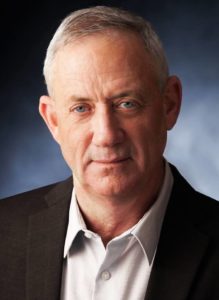
Benny Gantz (Wikimedia Commons)
Meanwhile, other Israelis are voicing their disapproval. Many former security officials warn that such a move could bring security risks, and thousands of left-wing Israelis have been demonstrating against the plan.
Washington says it will give the green light to annexation only when Israel’s coalition partners agree on the details. Netanyahu raised the specter of wider Israeli sovereignty after the Trump Administration unveiled a Mideast peace plan in late January.
The plan looks favorably on annexation, recognizing Israeli sovereignty over as much as 30% of the West Bank – although with the possibility of a Palestinian state on the rest of the land, connected by bridges and tunnels. President Donald Trump has also recognized Jerusalem as “Israel’s undivided capital” and moved the US Embassy there from Tel Aviv.
Palestinian officials have threatened to cancel bilateral agreements with Israel if it goes ahead with annexation, saying the move would kill the two-state solution.
Palestinian chief negotiator Saeb Erekat called it “ethnic cleansing,” saying it would lead to the “expulsion” of local Arab residents and shatter Palestinian dreams of a state.
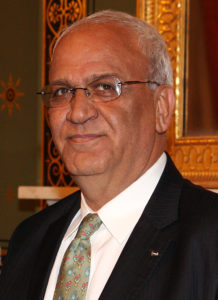
Saeb Erekat (Wikimedia Commons)
Palestinian Authority President Mahmoud Abbas’s spokesman Nabil Abu Rudeineh warned: “If Israel and America continue with this policy, things will head toward instability not only on the Palestinian scene, but also in the entire region.”
With the first of July rapidly approaching, Abu Rudeineh told The Media Line that the next few days would be crucial.
“We may be at a crossroads,” he said. “Everyone should know that the only map on the table is the Palestine map.”
He added that Palestinians, Arabs and much of the world would not stand idly by if Israel moved forward with annexation.
“If they [the Israelis] implement this, there will be Palestinian and Arab and internationally backed decisions, and they will be a surprise to everyone,” he stated.
Palestinians see the West Bank as the heartland of their future independent state, with east Jerusalem as its capital.
But officials in Ramallah are contradicting themselves on what they will do if Netanyahu goes ahead with the move.
Erekat told The Media Line that if Israel annexes as much as one inch of the West Bank, the PA would “cease to exist” and Israel would have to “shoulder its responsibility as an occupying power,” dumping in its lap responsibility for everything from paying salaries to collecting trash.
“Netanyahu and [US President Donald] Trump are trying to change the role and function of the Palestinian Authority to become an instrument to institutionalize occupation, annexation and apartheid,” he said. “He [Netanyahu] wants one state [and] two systems. Apartheid.”
PA Prime Minister Mohammad Shtayyeh, however, has made clear that the Palestinian Authority would be going nowhere.

Mohammad Shtayyeh (Wikimedia Commons)
“On the issue of dissolving the Palestinian Authority, look, let’s not fool ourselves,” Shtayyeh told members of the foreign press earlier this month.
“The PA is not a gift from anybody. The PA came into being because of the sacrifices of the Palestinian people since 1965 [when the PLO began its militancy campaign]. So, we are not waiting for somebody to give us less or more. It’s not a gift. And you don’t give a gift back,” he said.
“For us, the issue is not to dissolve the PA, throw away the keys and go home,” he explained. “But if Israel wants to destroy the Authority with the measures it is taking, we know how to resist it. And that is why I’m saying that the status quo cannot be maintained.”
Shtayyeh also called Israeli annexation an “existential threat” for the Palestinians.
Jibril Rajoub, secretary-general of Abbas’s Fatah movement, told The Media Line that Israel’s plan of annexation was like “firing the bullet of a coup de grace into an independent Palestinian state,” adding that Palestinians would act accordingly.
“We have a scenario,” he said, “to confront and prevent the implementation of the annexation plan, which might include civil disobedience and dealing with Israel as an enemy.” He refused to disclose further details.
We have a scenario to confront and prevent the implementation of the annexation plan, which might include civil disobedience and dealing with Israel as an enemy
Khaled Elgindy, a senior fellow at Middle East Institute in Washington, does not believe the PA would dissolve itself if Israel goes ahead with annexation.
“Institutions don’t voluntarily commit suicide,” he told The Media Line.
“I think it’s not enough [for the Palestinians] to simply say we’re going to pull the plug on the Palestinian Authority,” he said. “They have an obligation to tell the Palestinian people what their preparations are for the day after, but they haven’t done that.”
Elgindy added that the PA was facing a huge financial deficit. The US has cut off all aid, he noted, and wealthy Arab states and international donors aren’t contributing to the PA Treasury as much as they used to.
“The Palestinian leadership has been vague. They’ve made threats. It may simply be that,” Elgindy said, adding that they might “simply allow [the PA] to collapse” instead of ending it by their own hand.
To the surprise of Netanyahu and many others, his annexation plan is facing staunch opposition from an unlikely source: Israeli settlers.
Some leading settlers note that the Trump Administration’s vision for the Middle East potentially includes a Palestinian state, saying that annexation would just hurry this along and put an end to religious-Zionist ambitions for sovereignty over the entire West Bank.
Sentiments, therefore, are mixed among settlers, too.
Miri Maoz lives in the Psagot settlement, north of Jerusalem and adjacent to the West Bank city of Ramallah.
The Trump plan is a “historic opportunity to recognize Israeli sovereignty over the Israeli communities spread out in the West Bank,” she told The Media Line, adding that annexation would “massively change the lives of half a million Israelis like myself who live here and are not yet an officially recognized part of the State of Israel.”
But she has reservations, saying the “maps themselves show that Israeli sovereignty will only be on 30% of the territory, while Palestinians will receive 70% of the territory. And that will make most of our communities sort of like enclaves. It means that major parts of our communities will not be able to travel from one to another.”
To appease worried settlers, Netanyahu said in an interview last month that his annexation plan did not mention Palestinian statehood.
Yisrael Medad, who lives in the settlement of Shilo, north of Ramallah, told The Media Line that the plan was long overdue.
“We would like to be under Israeli law whether or not Israel fully extends its sovereignty to the entire area or just to the Jewish communities or even just to the Israeli citizens living there,” he explained.
Medad notes that he does not use the term “annexation,” saying the move is “simply applying the law of Israel to areas of the former Jewish national home.” He also is against statehood for the Palestinians.
“I think for Israel to have peace and security, a Palestinian state is a very bad idea,” he said. “We tried that with [the] Gaza [Strip]. We disengaged in 2005. We left the entire area. We took away all the Jews and all the houses and all the factories [but] we have not had peace or security.”
I think for Israel to have peace and security, a Palestinian state is a very bad idea. We tried that with [the] Gaza [Strip]. We disengaged in 2005. We left the entire area. We took away all the Jews and all the houses and all the factories [but] we have not had peace or security
Another thing about the annexation plan that worries settlers is the Trump Administration’s proposal for a freeze in all new settlement construction for at least four years.
“Keeping to the status quo is unhealthy,” Maoz told The Media Line, mentioning the need for better roads, medical centers and new infrastructure.
“Everything [will be] frozen,” she continued, “and we have to understand that people are going to continuing living here. There’s going to be growth.”
She says the plan does not satisfy the settlers, and settlements need to expand beyond their existing areas.
“The peace, the plan for prosperity [inherent in the Trump Administration’s proposal] means that we will have the ability to build, to grow, to expand, to have a normal, natural growth,” she stated. “Any conversation against that is stopping my human rights to live here in a normal life.”
To counter these fears, Netanyahu says any freeze in construction would also apply to the estimated 240,000 Palestinians living in Area C, which accounts for about 60% of the West Bank and is currently under full Israeli security and administrative control, as stipulated under the 1993 Oslo Accords [1].
(The Oslo Accords defined two other areas for the West Bank. Area A, comprising about 18% of the land and all of the major Palestinian cities and towns, is under full Palestinian administrative and security control, although the Accords give Israel the right to send in troops at times of “hot pursuit” of terror suspects, an aspect that has often led to friction between the two sides. Area B, accounting for about 22% of the West Bank, is administered by the Palestinian Authority while security remains in Israel’s hands.)
Other settlers are completely on board with the idea of annexation.
Oded Revivi, mayor of the large Efrat settlement, just to the south of Bethlehem in the West Bank, is a strong and enthusiastic supporter.
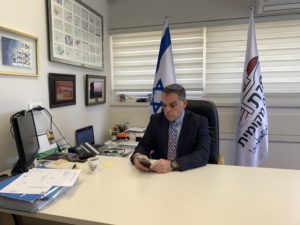
Oded Revivi (Mohammad Al-Kassim)
“They’re making a mistake,” he told The Media Line, referring to settlers who are against annexation due to the looming specter a Palestinian state.
“I’m not sure we can ever get a better deal than what’s being offered at the moment,” he said.
Revivi feels that Israel should waste no time, referring to the next several months as “a window of opportunity that could slam shut.”
The Middle East Institute’s Elgindy says there is a sense of urgency in Netanyahu’s office.
“I think the thinking now is political. It’s not so much about the realities on the ground,” he said.
“It’s a sense that the political window might be closing,” he explained.
“Trump may not be re-elected. The pro-annexation, greater-Israel constituency in Israel – which actually is very much a part of this Israeli government – feels like this is the moment to strike; they will never see another US administration that is as sympathetic to the pro-Israel agenda, to the greater-Israel agenda,” he stated.
Trump may not be re-elected. The pro-annexation, greater-Israel constituency in Israel – which actually is very much a part of this Israeli government – feels like this is the moment to strike; they will never see another US administration that is as sympathetic to the pro-Israel agenda, to the greater-Israel agenda
“They feel,” Elgindy said, “like this is the narrow window of opportunity between now and November, that they have to finally consolidate their long-held dream of a greater Israel and the elimination of any possibility of a Palestinian state.”
Another target of Netanyahu’s annexation plan having the stamp of approval from the Trump Administration is the Jordan Valley.
This area, which runs along the border with Jordan, accounts for around a third of the West Bank, the majority of its land falling within Area C.
It is a major breadbasket for the Palestinians, producing close to 60% of the vegetables they consume. As many as 65,000 of its Palestinian residents own about 12,300 acres of agricultural land. Also, close to 11,000 Israeli settlers, mainly farmers, live in settlements there.
Ibrahim Sawafta is a farmer and member of Bardala Village Council in the northern Jordan Valley. He claims that annexation has been “ongoing” since 1967.
“The application [control] on the ground has been applied for decades, in a systematic sequence carried out by the occupying power,” he told The Media Line.
Sawafta says that Palestinians living in the area are “forbidden to build and cultivate,” adding that “Israel controls 70-80% of the Jordan Valley and controls 90% of the water resources,” warning that if actual annexation takes place, “things will be worse.”
He urged the PA to provide immediate help to local residents.
“We need moral and material support from the Authority,” he said. “The PA must take a stand, and it must support farmers to strengthen their resilience in this region.”
Haj Abu Raed, an area elder and head of the Green Agricultural Cooperative Society in the northern Jordan Valley, told The Media Line that his village, Kardalah, will be annexed under Netanyahu’s plan.
“Trump gifts things that he does not possess to settlers,” he said, adding that no matter what happens, he is not going anywhere.
“We have a firm belief: This is our land, [which] we inherited from our forefathers. We will not give it up,” he stated.
He says that Israel is trying to talk directly to Palestinians in the area and discus with them ways to manage their daily lives [under annexation], but he himself is refusing any direct communication.
“We will never [allow a] substitute for our Palestinian national authority,” he said. “We are behind our authority, and we are not giving it up.”
On Monday, the Fatah movement held a massive rally in Jericho, in the southern part of the Jordan Valley, to send a message to Israel and the US that Palestinians are united on the issue of annexation, with the Arab and international communities behind them.
Thousands turned out, including the special Middle East envoy for the United Nations, Nickolay Mladenov.

Nickolay Mladenov (Wikimedia Commons)
“The UN believes annexation is against international law,” Mladenov said. “If it happens, it might kill the very idea that peace and statehood for the Palestinian people can be achieved through negotiations.”
Yet he urged those present to oppose the plan by peaceful means.
“People of Palestine do not despair…. Do not stray away from the path of non-violence,” he said.
“You’re not renting a home; this is your home,” he added. “Do not lose sight of the goal of a free Palestinian state… next to Israel.”
Lately, Netanyahu’s plan for annexation appears to have suffered a setback, with reports that he was told by the White House to slow down. US Ambassador to Israel David Friedman is currently in Washington for consultations on the timing of such a move in light of major Arab and international objections.
Friedman “represents the extremist wing of the US administration,” according to Abbas spokesman Abu Rudeineh.
“This is a colonial man, and this man does not work for peace,” he said. “This does not represent the American administration only, but rather the Israeli extreme.”
President Trump’s numbers are at their lowest since he took office in 2017. He is facing many domestic issues that could put his re-election in jeopardy, and this, says Elgindy, will have a direct impact on the annexation issue.
“There is certainly a relationship between domestic politics in the United States and what happens inside Israeli decision-making,” he said.
Elgindy says that because of internal Israeli friction, as well as Arab and international opposition to annexation, the plan might not be implemented at once.
“We are seeing some signs now that maybe they may not be moving… immediately toward annexation,” he said. “Maybe… a phased approach, starting with just the immediate areas of the settlements, and then maybe growing.”
The United Arab Emirates’ ambassador to Washington, Yousef al-Otaiba, took the unprecedented step of writing an op-ed piece that appeared in Hebrew in an Israeli newspaper, warning that Israel’s annexation plan threatened normalization with Arab states.
“It’s Either Annexation or Normalization,” the headline declared.
“Annexation will definitely, and immediately, reverse all of the Israeli aspirations for improved security, economic and cultural ties with the Arab world and the United Arab Emirates,” Otaiba wrote.
The Saudi foreign minister, Prince Faisal bin Farhan, said this week that annexation would be “a dangerous escalation that threatens the chances of resuming the peace process to achieve security and stability in the region.”
But the staunchest opposition, aside from that of the Palestinians, has been coming from Jordan, whose leader, King Abdullah II, told members of US Congress this week by videoconference that annexation is “unacceptable and undermines chances of peace and stability in the region.”
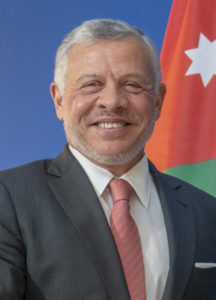
Abdullah II (Wikimedia Commons)
In a recent interview with German weekly news magazine Der Spiegel, Abdullah warned that annexation “would lead to a massive conflict” with his country.
Osama Al Sharif, a veteran Jordanian journalist and political commentator based in Amman, told The Media Line that the king has been very clear on the issue from the beginning.
“Since Mr. Netanyahu first announced, just before the [recent Israeli] elections, his pledge to go ahead with annexing major chunks of the West Bank, including the Jordan Valley, King Abdallah has been very swift… warning that such a move would kill the two-state solution; that it would be a breach of all agreements between Jordan and Israel [and between the] Palestinians and Israel; and that it would destabilize the region further.”
Sharif adds that Abdallah has been working hard to establish a united front among Arab states.
“Jordan has delivered a very strong and consistent message to Israel that annexation is a red line, that it would derail any attempt to reach a final settlement between the Arabs and the Israelis vis a vis the Palestinian question.”
European Union countries have also voiced concern, but Palestinians are not impressed.
In early June, Erekat, the Palestinian negotiator, criticized German Foreign Minister Heiko Maas in scathing terms during an interview with The Media Line [4].
He argued that Maas should have taken a stronger public position against annexation. He was also furious that the foreign minister had visited Israel and met with Netanyahu, but did not visit the Palestinian territories or meet with Abbas.
Erekat called Germany a “partner, a country we count on, and has full partnership with us. And the EU is one of our closest partners.” Yet the visit, he stated, did little for the Palestinians.
“I was expecting Mr. Maas to stand tall and say to the Israelis in the press conference, ‘If you do the annexation, there will be consequences, there will be sanctions, this is against international law.’ And there are precedents where Germany took actions against other nations when they annexed other territory,” Erekat said.
Among the Israelis who are opposed to annexation is Ksenia Svetlova, a former member of Knesset, the Israeli parliament, and currently a senior policy fellow at the Mitvim Institute for Foreign Policy.
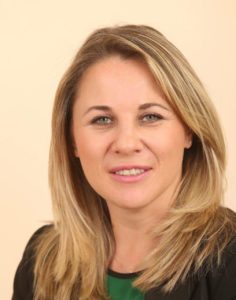
Ksenia Svetlova (Courtesy)
Svetlova, a member of a so-called peace parliament made up of dovish former Israeli lawmakers, told The Media Line that she and her colleagues wrote a letter to the US Congress urging them to oppose the annexation plan.
“I thought it’s a good idea to create some kind of contact and connection between those who support peace and justice, and the two-state solution, here in Israel and [among] our colleagues in the United States,” she said.
She says the price of annexation will be high.
“We believe that annexation is severely detrimental to Israel’s security, Israeli democracy, Palestinian rights and regional stability,” she stated, adding that everyone should know the ramifications “for regional stability, for Israeli stability, for the chances of peace in the region and also for the position of the United States in the region.”
She adds that the aim is to make sure this warning reaches as many people as possible.
“Our goal is to raise awareness to the dangers… in the unilateral annexation of parts of the West Bank. I’m talking not only as a former member of Knesset, but also as a former member of [its] Foreign Affairs and Defense Committee,” she noted.
She warns that annexation means an end to the two-state solution.
“We will never be able to separate from the Palestinians, ever, and then we will be stuck in a state that will no longer be Israel, a democratic, Jewish state, she said. “It will be a state that will have two… sets of laws… for the Israelis and for the non-Israelis.”
Svetlova also warned that annexation will have a deleterious effect on ties with Arab countries, including Jordan.
“What I hear from the Jordanian officials with whom I have a close connection, and we have occasional meetings, [is that] we might be witnessing… a deterioration of relations,” she stated. “With time, the peace treat [between the two countries] will be reduced to no-war treaty.”
Yet the letter Svetlova and her peace parliament colleagues wrote to Congress at her initiative may have found an audience: Three of Israel’s most stalwart boosters among Democrats in Congress are now warning against annexation.
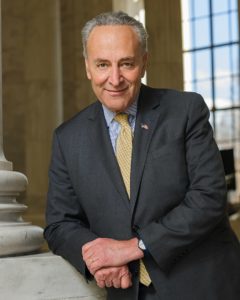
Chuck Schumer (Wikimedia Commons)
Sen. Chuck Schumer of New York, the minority leader, and fellow senators Ben Cardin of Maryland and Robert Menendez of New Jersey released a statement last Friday saying they were “compelled to express opposition to the proposed unilateral annexation of territory in the West Bank.”
They are just the latest Democrats in Congress to issue such a warning, but their concern might be the most significant, as they are often at the forefront of pro-Israel legislation.